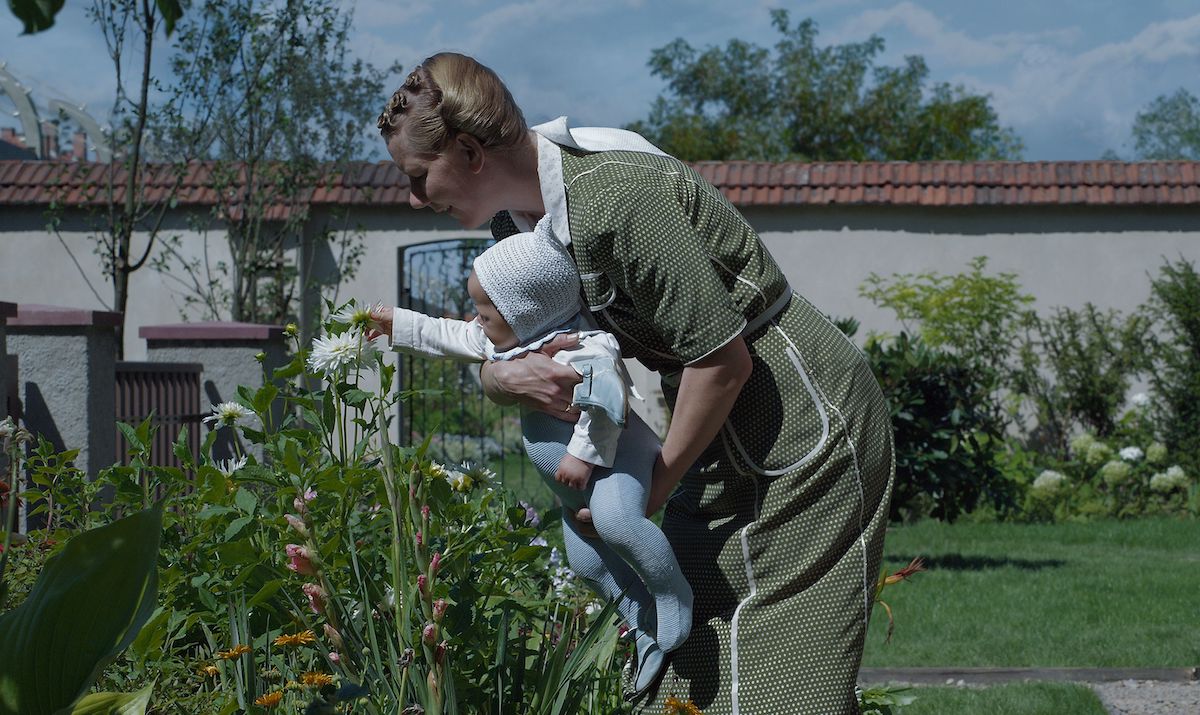‘The Zone of Interest’ Is a Must-See Study of Evil
5/5 stars

The Zone of Interest, written and directed by Jonathan Glazer and based on the book by Martin Amis, has a deceptively simple plot. Auschwitz commander Rudolf Höss (Christian Friedel) lives with his family in an upscale home with a lush, sprawling yard. Rudolf finds out he’s being transferred to another location; his wife Hedwig (Sandra Hüller) is angry at the thought of leaving their idyllic life behind. They amuse themselves by boating on the nearby river and inviting guests over for tea. Hedwig is proud of her Edenic garden, with grapevines and roses growing against one high concrete wall.
On the other side of that wall is Auschwitz itself.
The death camp is, arguably, the most important character in the film, and it roars at the edges of the characters’ perception. Sickening sounds float into the Hösses’ yard: gunshots, screams, and the constant rumble of the crematorium, whose voracious flames light up the night. The Höss family’s bucolic life is punctuated by the whistles of trains arriving at the camp.
Yet, thanks in part to Johnnie Burn’s ingenious sound design, the Höss family seems strangely immune to the horrors happening over the wall. They seem so blasé, in fact, that only the most ghastly atrocities seem to ruffle them, and it’s in those brief instances that we get the most intriguing character studies. The family and their home are seemingly at the center of the film, but the real story is what’s happening just beyond the camera lens. Friedel and Hüller do a remarkable job of conveying the hollowness at the center of the Hösses: two people who have signed away their souls for a pretty garden.
Yet, even in conditions as claustrophobically vile as these—and even in a story whose ending we already know—the film still manages to let in a tiny ray of hope. Yes, we’re confronted with the bottomless evil of a nice Nazi family, but we also see glimpses of people trying to help the Jews and other Auschwitz prisoners. The Hösses have let themselves become monsters, but around the edges of their story, we see people who have kept hold of their humanity.
The film’s visuals and story structure are stunning. The innovative camera work, for which Glazer and cinematographer Łukasz Żal installed hidden cameras in the house, creates the feeling that Höss and his family are subjects of study, or even surveillance. Some night scenes are shot with a thermal imaging camera, creating a dreamlike quality. At one point, the film jumps forward in what could be interpreted as one character’s sudden vision of the future. At another, as the film grapples with the incomprehensible nature of its subject matter, the screen simply burns into a bracing field of red. In portraying a crime too colossal for words, The Zone of Interest finds its own language to express what feels unspeakable.
The Zone of Interest is a breathtaking achievement, but there’s one thing that scares me: A solid Holocaust education is absolutely necessary to understand it. I’ve met Holocaust survivors and said Kaddish at the sites of mass graves. I immediately recognize the significance of a train whistle or a smoke stack. All around me, though, I see rising ignorance and denial of not just the Holocaust, but any genocide. When a work of art depends on a baseline of historical literacy, what happens when that work’s audience drifts further and further from that baseline? What happens when audience members literally don’t know what genocide looks like?
Most of us like to think that we would never support atrocities like the Holocaust. That genocide is the realm of monsters and villains, not decent people like us. However, The Zone of Interest gives lie to that idea. Genocide flourishes under the touch of people as ordinary as you or me, and although the real Rudolf Höss was eventually tried and executed for his crimes, many more Nazis—average citizens who were fine with exterminating people they didn’t like—walked free. As Auschwitz survivor Joseph Wulf, whose song “Sunbeams” is included in the film, put it shortly before his death in 1974: “You can document everything to death for the Germans …. Yet the mass murderers walk around free, live in their little houses, and grow flowers.”
The Zone of Interest comes out in theaters on December 15.
(featured image: A24)
Have a tip we should know? [email protected]
